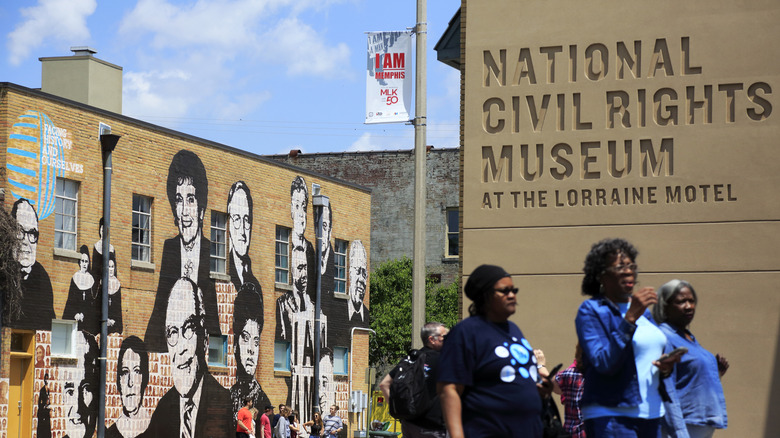'One Of The Most Culturally Significant Travel Projects' In America Is A Rick Steves-Approved Road Trip
While guidebook author and world traveler Rick Steves is known for advising travelers on their trips to Europe, on his radio show "Travel with Rick Steves", he gave his audience the opportunity to learn more about a route that was, for most of his listeners, a little closer to home: the U.S. Civil Rights Trail. You won't need any of Steves' tips for overcoming a language barrier on this trip, but that doesn't mean that there won't be a lot to learn at each destination along the way. In fact, this trail was heralded as "one of the most culturally significant travel projects in the United States," by Erick Prince who authors the travel page, Minority Nomad. The reason for this is because the U.S. Civil Rights Trail brings attention to some of the seemingly ordinary places where enormous historical shifts in the Civil Rights Movement took place, taking travelers on a journey not only across half the country but through an important period of time.
While it might be called a trail, this route is really a collection of more than 130 important historical sites which together, tell the story of some of the most pivotal moments of the ongoing fight for racial equality. If you want to, you can plan an epic road trip to see all of these sites one after another, but you can also break the trail up into more manageable pieces by planning day trips close to home or by using the trail as a checklist and visiting all the stops over time.
Stops on the Civil Rights Trail that you won't want to miss
On his radio show, Rick Steves interviewed Alabama tourism director Lee Sentell, who wrote a book about the Civil Rights Trail. Sentell told Steves, "I think that the Civil Rights landmarks across the South should inspire people when they come to visit because oftentimes what happened there was moments of great difficulty and tension and danger — but that's what it took to get the attention of Congress to pass Civil Rights Acts."
If you're already packing for your long road trip on the trail and following Rick Steves' recommendation on setting up your car GPS, you've probably noticed just how long it would take you to visit the dozens and dozens of stops on the Civil Rights Trail. During the interview with Steves, Sentell shared the top spots that travelers won't want to miss: the Lincoln Memorial to see the place where Dr. Martin Luther King Jr. delivered the famous "I Have a Dream" speech, the bronze statue of Barbara Johns and her fellow strikers fighting to desegregate schools in Virginia, and the National Civil Rights Museum to put everything into context. In his home state of Alabama, Sentell suggests visiting the 16th Street Baptist Church, which was targeted by a deadly bombing in 1963, and the Gaston Motel where Martin Luther King Jr. planned his influential marches.
Explore Civil Rights history across the states
On top of what was recommended by Sentell when speaking with Steves, there are also other sites to explore on the Civil Rights Trail across 15 U.S. states and Washington D.C. The official Civil Rights Trail website features itineraries for visiting the historic sites in each state, and all of them provide a unique experience. For instance, the Kansas itinerary includes hiking at Mount Mitchell Heritage Prairie in the footsteps of those who fled enslavement along the Underground Railroad, while Florida's includes a trip to the Harry T. & Harriette V. Moore Memorial Park & Museum to learn about this incredible couple and their fight for equal rights, from campaigning for teachers' salaries to fighting back against police brutality.
While there are inspiring, heartbreaking, and educational stops all along the trail, some of the most meaningful can be found in Alabama. Alabama's itinerary starts by taking travelers through the heart of the Civil Rights struggle in Birmingham. Then, you can explore Selma, where marches for Black Americans' right to vote made history. Next, travelers visit Montgomery, where you can see where Rosa Parks was arrested for refusing to adhere to racist segregation on city buses and then stand in the church where Dr. Martin Luther King Jr. preached. On your final day, travelers are directed to Montgomery and Tuskegee, where you can learn the stories of the first Black aviators in the U.S. at the Tuskegee Airmen National Historic Site and pay tribute to those who were murdered because of their race throughout American history at the National Memorial for Peace and Justice.


